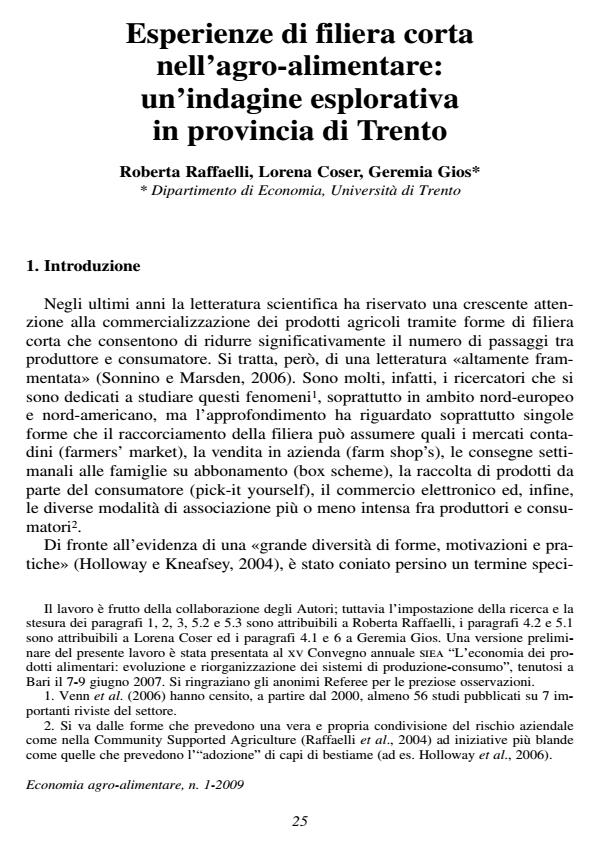Esperienze di filiera corta nell’agro-alimentare: un’indagine esplorativa in provincia di Trento
Titolo Rivista ECONOMIA AGRO-ALIMENTARE
Autori/Curatori Roberta Raffaelli, Lorena Coser, Geremia Gios
Anno di pubblicazione 2009 Fascicolo 2009/1
Lingua Italiano Numero pagine 18 P. 25-42 Dimensione file 134 KB
DOI 10.3280/ECAG2009-001003
Il DOI è il codice a barre della proprietà intellettuale: per saperne di più
clicca qui
Qui sotto puoi vedere in anteprima la prima pagina di questo articolo.
Se questo articolo ti interessa, lo puoi acquistare (e scaricare in formato pdf) seguendo le facili indicazioni per acquistare il download credit. Acquista Download Credits per scaricare questo Articolo in formato PDF

FrancoAngeli è membro della Publishers International Linking Association, Inc (PILA)associazione indipendente e non profit per facilitare (attraverso i servizi tecnologici implementati da CrossRef.org) l’accesso degli studiosi ai contenuti digitali nelle pubblicazioni professionali e scientifiche
Esperienze di filiera corta nell’agro-alimentare: un’indagine esplorativa in provincia di Trento - Experiences of short food supply chain: an explorative research in the province of Trento In the recent years there has been an increasing interest in the scientific literature for the so-called "Alternative Food Networks" which try to redefine the relationship between producers and consumers. Particularly interesting is the short food supply chain which allows both producers to get back some added value and consumers to have better food "with the farmers’ face on it". Moreover, some part of the literature stressed that a shorter food supply chain promotes the rise of a new and more territorially based rural development. The investigation approach has been mainly sociological or geographical and mostly based on case studies. Little attention has been devoted to quantify the involved farmers’ population. Since shorter food supply chains are becoming increasingly present in the Italian market, the aim of the paper is to contribute to deepen the knowledge about these experiences, starting from the specific context of the Autonomous Province of Trento. First of all, a census of the empirical variety of short food supply chains has been made. In addition to three farmer’s markets, one box scheme (Biocesta) and other similar initiatives, farmers open their farms to consumers and visitors. The integration of three different databases allowed us to estimate the number of farms involved in the short supply chain. It represents the 12,8% of the full time farms. In order to shed light on structural conditions, economic performance and farmers’ perceptions, we surveyed a convenience sample of 36 farms involved in the most innovative forms of short food supply chain. The surveyed farms are of small dimensions; the farmers are well educated and they are fully involved in the short food supply chain. Most part of the farms is highly diversified: the average number of products is 4.4 and the diversification is strengthened trough some processing. Only 28% of the sample sells the whole production through the short supply chain: this confirms that the major part of farms does not abandon the conventional system when opting for a shorter supply chain. Investigating the motivations that draw farmers to move towards a shorter supply chain shows that a better valorisation of their products represents the most important one. Nevertheless, other non-monetary reasons enter into the decision and gain top ranking positions such the direct contact with consumers and the enhancement of professional competences. The option for a shorter supply chain seems to have very interesting consequences. Actually, it pushed the 72% of farms to increase product diversification; it induced some farms to switch to organic production, to recover unusual vegetables and antique fruit cultivars, to pay greater attention to the landscape, to offer new services inside the farm and to strength the relations with other farms and the territory. These results support the idea that the short food supply chain enhances the multifunctional role of farms.
JEL Codes: Q12, Q13
Key words: short food supply chain, farmers’ survey, structural and economic characteristics, Trentino;
- Multi-Actor Governance for a Circular Economy in the Agri-Food Sector: Bio-Districts Stefano Poponi, Gabriella Arcese, Enrico Maria Mosconi, Francesco Pacchera, Olimpia Martucci, Grazia Chiara Elmo, in Sustainability /2021 pp.4718
DOI: 10.3390/su13094718 - The Effects of Cloud Approach in Short Chain Administration Francesco Contò, Nicola Faccilongo, Piermichele La Sala, in International Journal of Agricultural and Environmental Information Systems /2015 pp.19
DOI: 10.4018/ijaeis.2015010102 - Consumer perceptions and attitudes towards Farmers' Markets: the case of a Slow Food "Earth Market"® Claudia Bazzani, Daniele Asioli, Maurizio Canavari, Elisabetta Gozzoli, in ECONOMIA AGRO-ALIMENTARE 3/2017 pp.283
DOI: 10.3280/ECAG2016-003003 - Are Peach Cultivars Used in Conventional Long Food Supply Chains Suitable for the High-Quality Short Markets? Cosimo Taiti, Corrado Costa, William Antonio Petrucci, Laura Luzzietti, Edgardo Giordani, Stefano Mancuso, Valter Nencetti, in Foods /2021 pp.1253
DOI: 10.3390/foods10061253 - La filiera corta: una possibile strategia per migliorare la competitività dell'azienda agraria Anna Maria Di Trapani, Filippo Sgroi, Riccardo Testa, in ECONOMIA AGRO-ALIMENTARE 2/2013 pp.35
DOI: 10.3280/ECAG2013-002003 - The Short Food Supply Chain: A Concrete Example of Sustainability. A Literature Review Sara Fabbrizzi, Nicola Marinelli, Silvio Menghini, in RIVISTA DI STUDI SULLA SOSTENIBILITA' 2/2014 pp.189
DOI: 10.3280/RISS2014-002012 - Analyzing Alternative Food Networks sustainability in Italy: a proposal for an assessment framework Luigi Mastronardi, Davide Marino, Vincenzo Giaccio, Agostino Giannelli, Margherita Palmieri, Giampiero Mazzocchi, in Agricultural and Food Economics 21/2019
DOI: 10.1186/s40100-019-0142-8 - Rural sustainability and food choice: the effect of territorial characteristics on the consumers’ preferences for organic lentils Chiara Paffarini, Biancamaria Torquati, Tiziano Tempesta, Sonia Venanzi, Daniel Vecchiato, in Agricultural and Food Economics 29/2021
DOI: 10.1186/s40100-021-00200-9 - Alternative food chains as a way to embed mountain agriculture in the urban market: the case of Trentino Emanuele Blasi, Clara Cicatiello, Barbara Pancino, Silvio Franco, in Agricultural and Food Economics 3/2015
DOI: 10.1186/s40100-014-0023-0
Roberta Raffaelli, Lorena Coser, Geremia Gios, Esperienze di filiera corta nell’agro-alimentare: un’indagine esplorativa in provincia di Trento in "ECONOMIA AGRO-ALIMENTARE" 1/2009, pp 25-42, DOI: 10.3280/ECAG2009-001003